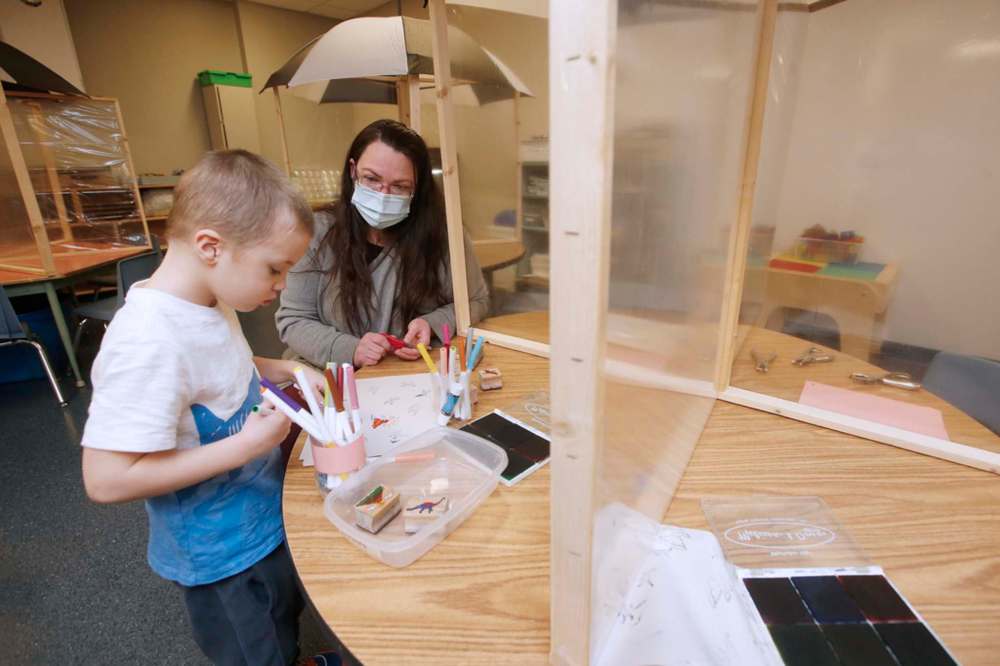COVID compromises key time for preschoolers
Advertisement
Read this article for free:
or
Already have an account? Log in here »
To continue reading, please subscribe:
Monthly Digital Subscription
$1 per week for 24 weeks*
- Enjoy unlimited reading on winnipegfreepress.com
- Read the E-Edition, our digital replica newspaper
- Access News Break, our award-winning app
- Play interactive puzzles
*Billed as $4.00 plus GST every four weeks. After 24 weeks, price increases to the regular rate of $19.95 plus GST every four weeks. Offer available to new and qualified returning subscribers only. Cancel any time.
Monthly Digital Subscription
$4.99/week*
- Enjoy unlimited reading on winnipegfreepress.com
- Read the E-Edition, our digital replica newspaper
- Access News Break, our award-winning app
- Play interactive puzzles
*Billed as $19.95 plus GST every four weeks. Cancel any time.
To continue reading, please subscribe:
Add Free Press access to your Brandon Sun subscription for only an additional
$1 for the first 4 weeks*
*Your next subscription payment will increase by $1.00 and you will be charged $16.99 plus GST for four weeks. After four weeks, your payment will increase to $23.99 plus GST every four weeks.
Read unlimited articles for free today:
or
Already have an account? Log in here »
Hey there, time traveller!
This article was published 12/01/2021 (1843 days ago), so information in it may no longer be current.
Despite being on a holiday break, preschooler Olive Breckon couldn’t quite relax.
The four-year-old was so hyper-aware of hygiene — the result of practising COVID-19 safety protocols at daycare and nursery school throughout autumn — she asked her parents to serve her meals using tongs. Olive insisted on staying home so she wouldn’t have to wear a face mask or go near other people. She counted aloud the seconds her parents washed their hands.
“She became pretty anxious about germs. It took a long time to get her to even leave the house,” said Corinne Mason, recalling she and her partner’s efforts to calm and coax Olive into going on a walk with the dog during the initial days of the recent holiday break.

For Olive and thousands of youngsters who also started school this year, pandemic precautions and formal education are intertwined. Meantime, some parents are postponing their child’s introduction to school to limit close contacts.
Either way, preschoolers across the province are now missing out on many of the early hands-on learning opportunities they would typically have at daycare, playgroups and the park.
Between age two and five is a key developmental period for a child’s socialization, during which they learn everything from how to get along with others to what it means to have good manners, said Sheri-Lynn Skwarchuk, a professor of education and the development studies program director at the University of Winnipeg.
The inability to see a teacher’s expression under a mask or share playdough complicates learning such lessons, Skwarchuk said.
“I am worried. However, our young kids are resilient. We just have to make sure we keep education on the radar,” she said. “If children aren’t exposed to these quality environments, focusing on play and on their interests, then parents need to find alternatives to make sure that opportunities are happening at home.”
While it’s too early to know whether there will be any long-term developmental effects, researchers and early childhood educators alike suggest children will remain resilient.
The tots at Oak Street Nursery School often talk about not being able to see their grandparents or hug their friends, and so, director Karlin Mann said her team is focused on “keeping things as normal as we can” to care for their social-emotional needs.
“That’s our job through all of this, to make sure kids feel supported, they feel safe, and they feel excited about things,” Mann said.
The nursery school has set up tables with clear partitions and umbrellas on top of them to promote physical distancing while allowing students to see each other. They are an unusual sight, but Mann said educators have been getting students excited about using the umbrella tables — so much so, they’re going to keep them around post-pandemic.
Much attention has been focused on what and how students are learning in class this year, but Prof. Tracie Afifi’s main concerns surround what’s happening at home.

“What worries me the most about the pandemic is with elevated stress for parents, may come elevated physical discipline,” said Afifi, Canada Research Chair in childhood adversity and resilience, who teaches community health sciences at the University of Manitoba.
When caregivers take care of their own well-being and feel supported, kids have better outcomes, she added.
Parenting during a pandemic is no easy task, but Mason and her partner are managing with some help from Olive’s teachers and the advice of other queer parents in their social circle.
“It’s so important for us that she goes to school and continues to go to school to have those child experiences, more than anything,” Mason said, adding spontaneous games aren’t the same with parents as they are with imaginative peers.
maggie.macintosh@freepress.mb.ca
Twitter: @macintoshmaggie

Maggie Macintosh
Education reporter
Maggie Macintosh reports on education for the Free Press. Originally from Hamilton, Ont., she first reported for the Free Press in 2017. Read more about Maggie.
Funding for the Free Press education reporter comes from the Government of Canada through the Local Journalism Initiative.
Every piece of reporting Maggie produces is reviewed by an editing team before it is posted online or published in print — part of the Free Press‘s tradition, since 1872, of producing reliable independent journalism. Read more about Free Press’s history and mandate, and learn how our newsroom operates.
Our newsroom depends on a growing audience of readers to power our journalism. If you are not a paid reader, please consider becoming a subscriber.
Our newsroom depends on its audience of readers to power our journalism. Thank you for your support.


